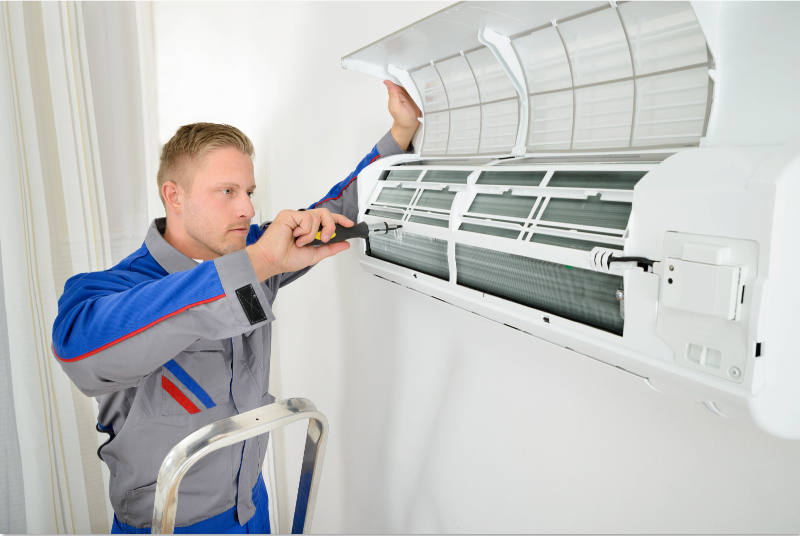In the current landscape, the importance of Heating, Ventilation, and Air Conditioning, commonly known as HVAC, cannot be overstated, especially in office settings. A efficient HVAC system plays a vital role in maintaining pleasant indoor environments, which directly impacts output, well-being, and general health for both employees and customers. Grasping the nuances of HVAC systems is crucial for company leaders and facility managers who want to ensure maximum performance and energy efficiency.
This detailed guide will cover multiple facets of HVAC, from the foundations of how these systems work to diagnosing typical challenges, and from care tips to the latest innovations in the field. Whether you are looking to enhance your current system or simply want to learn how to effectively control your HVAC for improved air quality and energy savings, this article is designed to provide you with the insight you need to make smart selections. Come along as have a peek at these guys explore the essential role of HVAC in boosting the functionality and suitability of business environments.
Grasping HVAC Systems
HVAC stands for warmth, airflow, and air conditioning, a critical system in both spaces. This comprehensive system is designed to provide convenience through climate regulation and quality control of air. By grasping how HVAC functions, property owners can make informed decisions regarding installation, maintenance, and improvements to ensure efficient performance.
Warmth is typically achieved through multiple methods, including furnaces, water heaters, and heat pumps, which heat the air or distribute warm water throughout the building. Airflow is essential for maintaining indoor air quality, involving the swap of indoor air with fresh outdoor air. Cooling systems, mainly using HVAC systems, help reduce indoor temperatures during warmer months, ensuring a comfortable environment regardless of external conditions.

As commercial entities and corporate spaces strive for energy efficiency and environmental responsibility, cutting-edge HVAC technologies are becoming increasingly vital. Smart thermostats and state-of-the-art filtration systems enhance control over interior environments and air quality, making it simpler for businesses to reduce energy consumption and boost overall comfort. As a consequence, understanding HVAC systems not only supports a healthier indoor environment but also advances efficiency goals for commercial settings.
HVAC Maintenance and Efficiency
Consistent service of your HVAC system is crucial for ensuring it works effectively. Scheduled inspections and tune-ups can identify potential issues before they worsen, leading to expensive repairs or replacements. Keeping filters free of debris and components correctly calibrated helps to preserve optimal air circulation and energy efficiency. A well-maintained system not only lowers you money on utility costs but also prolongs the lifespan of your equipment, which is especially important for business spaces that count on consistent climate control.
Effectiveness is a crucial factor for both domestic and commercial HVAC systems, as maintaining a comfortable environment is crucial for productivity and comfort. When HVAC systems are running at optimal performance, they consume less energy to heat or chill a space. This is crucially relevant in more extensive buildings where energy costs can be substantial. Implementing eco-friendly solutions, such as improving equipment or using smart thermostats, can substantially reduce energy consumption while boosting overall performance.
Ultimately, committing to regular HVAC maintenance and seeking out ways to improve efficiency can provide significant long-term benefits. For businesses, this means creating a more inviting environment for employees and clients, promoting productivity, and enhancing indoor air quality. By remaining ahead of maintenance and making informed decisions about upgrades, businesses can ensure their HVAC systems stay trustworthy and economical for years to come.
HVAC for Commercial Spaces
HVAC systems play a vital role in commercial spaces, ensuring a comfortable and efficient environment for workers and customers alike. Proper heating, ventilation, and air conditioning are necessary for maintaining a stable indoor climate, which can significantly affect employee productivity. By regulating temperature and humidity levels, an effective HVAC system creates a pleasant atmosphere that enhances focus and efficiency among employees, making it a crucial component of any commercial building.
Additionally, commercial buildings often have more extensive spaces and more complex ventilation requirements, making the selection and maintenance of HVAC systems critical. Businesses must assess their individual needs based on the size of their space, the number of occupants, and the nature of their operations. Regular maintenance is necessary to prevent typical problems, such as uneven temperature distribution or inadequate airflow, which can lead to inconvenience and lower employee morale. By investing in a reliable and high-performance HVAC system, businesses can improve indoor air quality and reduce energy costs.
Moreover, advancements in HVAC technology have introduced energy-efficient solutions tailored for commercial applications. Businesses can benefit from smart HVAC systems that respond to occupancy patterns and optimize energy use, resulting in substantial cost savings. Furthermore, innovations such as geothermal heating and cooling or solar-powered HVAC systems can provide sustainable options that contribute to a company's sustainability goals. Overall, focusing on HVAC in commercial spaces not only enhances comfort and productivity but also aligns with the growing demand for energy efficiency and sustainability.
